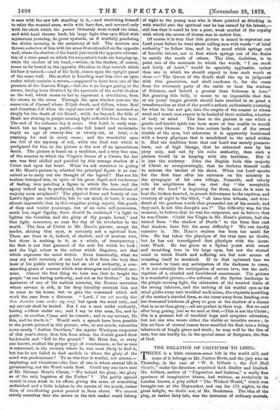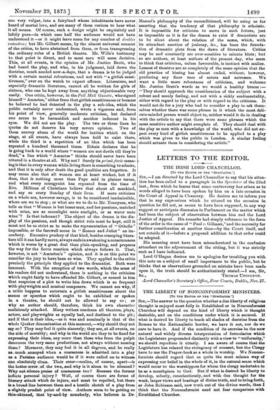THE RELATION OF CRITICISM TO LIBEL.
THERE is a little common-sense left in the world still, and some of it belongs to Mr. Justice Brett, and the jury who on Thursday, in the case of " W. S. Gilbert v. the Pall Mall Gazette," under his direction acquitted both libeller and libelled. Mr. Gilbert, author of " Pygmalion and Galatea," a really fine specimen of imaginative drama, had written, as everybody in London knows, a play called "The Wicked World," which was brought out at the Haymarket, and ran for 175 nights, to the great delight, we doubt not, of Mr. Backatone. The idea of the play, or rather fairy tale, was the intrusion of ordinary mortals, one very vulgar, into a fairyland whose inhabitants have never heard of mortal love, and are many of them curious to hear what it all means. Of course, such a design might be exquisitely and loftily pure—in which case half the audience would not have understood it —or it might leave room for any number of doubles entendres; but Mr. Gilbert seems, by the almost universal consent of the critics, to have abstained from them, or from transgressing the ordinary rules of a British theatre. Mr. %Villa's testimony to that point is direct, and to most men will seem decisive. This, at all events, is the opinion of Mr. Justice Brett, who I had heard the play, and who, in his judgment, laid down the doctrine, much needed now-a-days, that a drama is to be judged with a certain mental robustness, and not with " a girlish sensi- tiveness," ever on the watch to expect offence. Literature, and especially dramatic literature, cannot all be written for girls of sixteen, who can be kept away from anything objectionable very easily. One critic, however, in the Pall Mall Gazette, who signed himself " Amuetos," either from that girlish sensitiveness or because he believed he had detected in the play a sub-idea, which the public certainly never understood, wrote a vigorous and, from his point of view, generally moderate criticism, but declared one scene to be barmaidish and another indecent in his eyes. We did not see the play. The two or three lines he quotes do not deserve his very severe opinion. Two of them convey abuse of the world for laxities which on the stage, at all events, have always been held to exist there, while the third is a repetition of an idea which has been repeated a hundred thousand times. Ethais declares that he is going back to a world where " women are not devils till they're dead," a line which " Amuetos " thinks should never have been uttered in a theatre at all. Why not? Surely its priniii facie mean- ing is that in every woman while living there is something to admire, and that it is only after death the good qualities are forgotten. It may mean also that all women are at heart wicked, but if it does, that is nothing more than Pope said in plainer terms, and what every misogynist has repeated from the time of Eve. Millions of Christians believe that about all mankind, and say so every Sunday of their lives. If mere criticism on a whole sex, however savage, is to be considered inadmissible, where are we to stop ; or what are we to do to Mr. Tennyson, who tells us that " Woman is but lesser mar, and her passions, matched with mine, are as moonlight unto sunlight, or as water unto wine"? Is that indecent ? The object of the drama is the dis- play of the passions, and though strict rule must be kept, still it must not be so strict as to make the representation of " Othello" impossible, or the farewell scene in " Romeo and Juliet" an im- modesty. Excessive prudery of that kind, besides cramping litera- ture till it can hardly move, always ends in awakening a consciousness which is worse by a great deal than plain-speaking, and prepares the way for the fierce reaction which always follows it. That, however, is not "Amuetos's " opinion, and it is on this point we consider the jury to have been so wise. They applied to the critic precisely the principle they applied to the dramatist. Both were innocent. With the exception of two words, which the mass of his readers did not understand, there is nothing in the criticism which ought fairly to have offended Mr. Gilbert, or roused in him that suspicion of a plot to write him down which is so frequent with playwrights and musical composers. We cannot see why, if a critic happens to entertain a girlish sensitiveness about the scenes or speeches which ought to be exhibited or spoken in a theatre, he should not be allowed to say so ; or why an author should, therefore, think his own character maliciously attacked. Many writers condemn all theatres, plays, actors, and playwrights as equally bad, and destined to the pit ; and if that is their idea,—as it was and nominally is that of the whole Quaker denomination at this moment,—why should they not say so? They may feel it quite sincerely; they are, at all events, on the side of morality; and why in the world are they to be fined for expressing their ideas, any more than those who from the pulpit denounce the very same productions, not always without naming them? Moreover, they may feel it in all degrees, and be really as much annoyed when a coarseness is admitted into a play as a Parisian audience would be if it were called on to witness one absolutely clean. Their error—malice, of course, apart—is the better error of the two, and why is it alone to be silenced ? Why not silence praise of coarseness too ? Because the former inflicts personal injury ? Well, of course there are forms of literary attack which do injure, and must be repelled, but there is a broad line between them and a hostile sketch of a play from a slightly prudish point of view. Authors seem to be getting so thin-skinned, that by-and-by somebody, who believes in Dr- MansePs philosophy of the unconditioned, will be suing us for asserting that the tendency of that philosophy is atheistic. It is impossible for criticism to move in such fetters, just as impossible as it is for the drama to exist if dramatists are to be silent about the relation of the sexes, which, with its attendant emotion of jealousy, &o., has been the founda- tion of dramatic plots from the dawn of literature. Critics may be and constantly are over-sensitive to minute blots ; but so are authors, at least authors of the present day, who seem to think that criticism, unless favourable, is instinct with malice. Lessees of theatres are so completely of the same opinion that the old practice of hissing has almost ended, without, however, producing any finer race of actors and actresses. We want a little more robustness of criticism, and welcome Mr. Justice Brett's words as we would a healthy breeze :— " They should approach the consideration of the subject with a robust and manly feeling, and not with a sickly sentimentality, either with regard to the play or with regard to the criticism. It would not do for a jury who had to consider a play to ask them- selves whether there was some phrase in it which the most deli- cate-minded person would object to, neither would it do in dealing with the article to say that there were some phrases which the most sensitive author might complain of. They should deal with the play as men with a knowledge of the world, who did not ex- pect every kind of girlish sensitiveness to be applied to a play which was given to the public in London. A similar feeling should actuate them in considering the article."







































 Previous page
Previous page